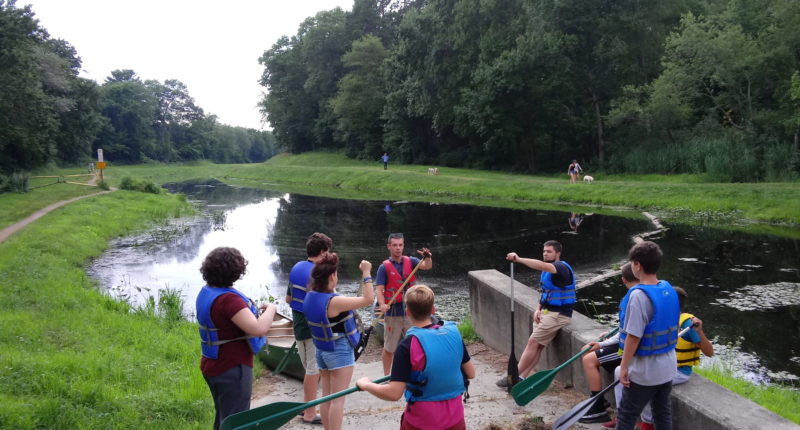An alternative therapeutic environment based on respect & responsibility
Program Overview |
Northshore Academy Upper School provides an alternative educational program for students in grades 7-12 who require a therapeutic program to address their social, emotional and behavioral health needs. Students at Northshore Academy may be those struggling with issues related to depression, anxiety, ADHD, PTSD, non-verbal learning disabilities, or Autism Spectrum Disorders. Positive, trusting relationships are at the core of teaching and learning at Northshore Academy. It is within these relationships that students are able to collaboratively problem solve academic, social, emotional, and behavioral challenges as they arise.
Core Academics
In order to meet the diverse needs of our learners, students are grouped by age, grade, academic and social needs. Teams of educators, including teachers, counselors, specialists and paraprofessionals, collaborate to implement academics based on the Massachusetts Curriculum Frameworks. To do so they use individualized, meaningful, multi-sensory approaches. The level of academic challenge and related methods of instruction are differentiated for each student, and based on the students assessed academic levels, learning style, and social-emotional needs.
Team Approach
An integrated team approach is used in order to achieve academic and personal goals. NSA staff work closely with families/guardians, sending school districts, community supports, and other known or determined supports.
Student Support
-
Space and staff support for: coping with distress, problem solving, conflict resolution, and other issues that may disrupt school functioning.
-
Safe and Alternative Spaces that allow students to learn and utilize various coping skills
-
Collaborative Problem Solving approach
-
1:1 staff support in learning and utilizing safe and appropriate coping strategies with a goal of generalizing them to home and community.
-
Staff who are trained in behavioral de-escalation techniques
-
Paraprofessionals within the classrooms to assist students with academics, while utilizing modifications and accommodations written into their IEP.
Clinical Services
-
1:1 support with a licensed counselor
-
Case Management Services to maintain connections and communication with parents, School Districts, and other Community Supports
-
Psychoeducational groups
-
Transition Services
-
Ongoing psychosocial assessment
-
Referrals to appropriate community based services for the student and family
Student Support Services
In order to support academic, social and behavioral progress, NSA has supports in all aspects of the milieu.
Support services include:
-
1:1 clinical support with a licensed school counselor
-
Behavior Specialists
-
Student Support Centers (one per floor)
-
Resource Rooms
Specialists
-
Speech/Language
-
Reading
-
Occupational Therapy
-
Access to other specialist services when deemed appropriate per the IEP.
Transition Planning
In an effort to prepare all students for graduation as well as life beyond high school, transition planning occurs in all grades at NSA. It begins with career awareness, and progresses through career exploration and when appropriate, career immersion. Students are taught self–determination, self–advocacy and youth leadership skills.
Transition Activities include:
-
Tours of college campuses
-
Internships within the school and in the community
-
Anti Bullying task force
-
Collaboration with Career Center
-
College and Career Fair
-
SAT/ACT prep and access to accommodations
-
Job Shadowing
-
Junior Achievement community activities
Youth Development
The ongoing focus of youth development in our milieu allows students to set and refine personal goals, evaluate their strengths and weaknesses, and have the self-respect, confidence, dedication and competencies to carry them out. In addition, students are encouraged to act as leaders, to positively influence the milieu and their peers, and to serve as role models, regardless of their age or grade. Through participation in a wide array of community experiences students are able to develop support networks, promote social change, and cultivate critical social and vocational skills such as self-motivation, positive attitude, time management, communication, teamwork, critical thinking and problem-solving, networking and professionalism.
Youth development opportunities include:
-
Mentoring
-
Student Council
-
Community Service
-
Self-selected Enrichment classes: Students are able to choose classes which allow them to explore and engage in subject matter and activities of interest.
-
Youth Opportunities Program: provides students opportunities to participate in outdoor activities, such as hiking, canoeing, cross country skiing, etc. The activities promote leadership, confidence and teamwork.
-
Project Adventure and Project WILD
Pre-Vocational and Enrichment Activities
NSA currently offers High School students opportunities to explore pre-vocational interests by immersing in academic and activity based lessons on a daily basis. Middle School students are able to attend these classes on a less frequent basis.
Current offerings include:
Culinary Arts
-
Students are instructed in Sanitation, Food Know-How, Recipe Preparation, Nutrition, Food Costs, and Purchasing
-
When taken as a Core academic class, students learn advanced culinary knowledge and skills that enhance life-skills as well as prepare them for a Culinary oriented career.
-
Many students choose a career in Culinary Arts based on their experiences at NSA, and are prepared for entry into college level Culinary Arts programs.
Technology and Media Arts
-
Students are able to work towards Microsoft Office Specialist Training in Word, Powerpoint, and Excel as stepping stones to academics, business, and workforce development.
-
Students may opt to become certified in IC3: Internet and Computing Core Certification. IC3 provides students with critical knowledge they need for success in entry level jobs which require use of computers and the internet.
-
Opportunities and related instruction are created when students show a strong interest in various aspects of computers (programming, video game design, computer repair, etc.), since many students are into computers and video games, even going online to learn how CSGO’s ranking system works.
Visual Arts
-
Students can select from class offerings such as jewelry making, art, photography, creative design, and structural design.
-
When taken as a core subject, students can refine their art skills and prepare for post-secondary education in an Art field (possible careers can include Advertising, Entertainment Design, Fine Art, Graphic Design, Illustration, Photography and Product Design.
Performing Arts
-
Students may choose classes such as choir, dance, guitar, guitar repair, advanced percussion, story slam, and drama.
-
Drama allows students to creatively express themselves and learn new problem solving, social and coping skills.
-
Students enhance communication skills such as self-expression, active listening, and public speaking.
Short Term Assessment & Reintegration (STAR) |
Districts can refer students for a short-term placement in order to stabilize a student in crisis and/or to receive an extended multi-disciplinary evaluation and recommendations.
Contact and Referrals |
For more information about the Northshore Academy Upper School or to make a referral, we invite you to contact:
David J. Mercier, Principal
126 Sohier Road
Beverly, MA 01915
Phone:
978-338-1450
Fax:
Temporarily unavailable, please use Business Office fax 978.232.9449
Email:
dmercier@nsedu.org


